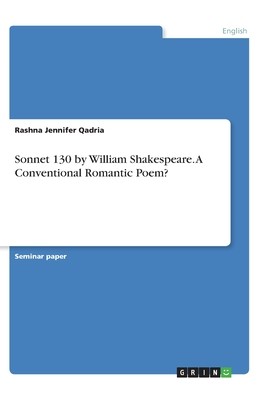
- We will send in 10–14 business days.
- Author: Rashna Jennifer Qadria
- Publisher: GRIN Verlag
- Year: 2020
- Pages: 20
- ISBN-10: 3346219135
- ISBN-13: 9783346219138
- Format: 14.8 x 21 x 0.1 cm, softcover
- Language: English
- SAVE -10% with code: EXTRA
Sonnet 130 by William Shakespeare. A Conventional Romantic Poem? (e-book) (used book) | bookbook.eu
Reviews
Description
Seminar paper from the year 2017 in the subject English Language and Literature Studies - Literature, grade: 2,3, University of Wuppertal, language: English, abstract: This paper examines the completely different image of a "mistress" Shakespeare created in Sonnet 130 with the help of a specific rhyme scheme and various types of stylistic devices. His choice of the poetic devices leads the reader to change their perceptions about a perfect and beautiful "mistress". In the earlier ages, many authors in the Elizabethan period followed the tradition of the famous poet Petrarch, who described a "mistress" as an idealized woman, a beauty a lot of women cannot acquire. The description of a "mistress" was in Petrarch's love poems similar. A human being with no blemish was presented to the reader. At the end of the Elizabethan Age, the poems about a "mistress" changed. William Shakespeare, a famous actor and writer, began to write various types of plays and sonnets. In contrast from other authors, Shakespeare switched the gender he wanted to praise. For a long time, the readers at this time were used to reading love poems about a "mistress". Nevertheless, Shakespeare chose to honour a man than a woman. About 26 sonnets, written by Shakespeare, were about a lady with many different characteristics than it was common at his time.
EXTRA 10 % discount with code: EXTRA
The promotion ends in 19d.06:52:42
The discount code is valid when purchasing from 10 €. Discounts do not stack.
- Author: Rashna Jennifer Qadria
- Publisher: GRIN Verlag
- Year: 2020
- Pages: 20
- ISBN-10: 3346219135
- ISBN-13: 9783346219138
- Format: 14.8 x 21 x 0.1 cm, softcover
- Language: English English
Seminar paper from the year 2017 in the subject English Language and Literature Studies - Literature, grade: 2,3, University of Wuppertal, language: English, abstract: This paper examines the completely different image of a "mistress" Shakespeare created in Sonnet 130 with the help of a specific rhyme scheme and various types of stylistic devices. His choice of the poetic devices leads the reader to change their perceptions about a perfect and beautiful "mistress". In the earlier ages, many authors in the Elizabethan period followed the tradition of the famous poet Petrarch, who described a "mistress" as an idealized woman, a beauty a lot of women cannot acquire. The description of a "mistress" was in Petrarch's love poems similar. A human being with no blemish was presented to the reader. At the end of the Elizabethan Age, the poems about a "mistress" changed. William Shakespeare, a famous actor and writer, began to write various types of plays and sonnets. In contrast from other authors, Shakespeare switched the gender he wanted to praise. For a long time, the readers at this time were used to reading love poems about a "mistress". Nevertheless, Shakespeare chose to honour a man than a woman. About 26 sonnets, written by Shakespeare, were about a lady with many different characteristics than it was common at his time.


Reviews